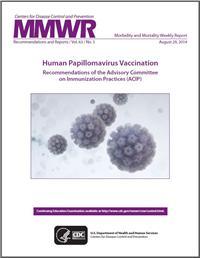Visit Website:
This report summarizes the epidemiology of human papillomavirus (HPV) and associated diseases, describes the licensed HPV vaccines, provides updated data from clinical trials and postlicensure safety studies, and compiles recommendations from CDC’s Advisory Committee on Immunization Practices (ACIP) for use of HPV vaccines. Persistent infection with oncogenic HPV types can cause cervical cancer in women as well as other anogenital and oropharyngeal cancers in women and men. HPV also causes genital warts. Two HPV vaccines, bivalent HPV vaccine (HPV2) and quadrivalent HPV vaccine (HPV4) are licensed for use in the United States. Both vaccines protect against HPV types 16 and 18, which cause 70% of cervical cancers. HPV type 16 also causes the majority of other cancers attributable to HPV. HPV4 also protects against HPV types 6 and 11, which cause >90% of genital warts and recurrent respiratory papillomatosis. Both vaccines are administered in a 3-dose series. ACIP recommends routine vaccination with HPV4 or HPV2 for females aged 11 or 12 years and with HPV4 for males aged 11 or 12 years. Vaccination also is recommended for females aged 13 through 26 years and for males aged 13 through 21 years who were not vaccinated previously. Males aged 22 through 26 years may be vaccinated. ACIP recommends vaccination of men who have sex with men and immunocompromised persons (including those with HIV infection) through age 26 years if not previously vaccinated. As a compendium of all current recommendations for use of HPV vaccines, information in this report is intended for use by clinicians, vaccination providers, public health officials, and immunization program personnel as a resource.
Format:
Serial
Publication Date:
2014
ID:
35919
- Health Planners
- Physicians
- STD/STI


